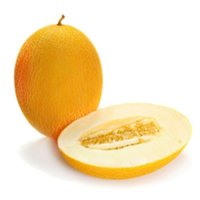Melon

It is widely believed that melon is a native of Central and Asia Minor, however, melon varieties that come from Africa and China are known. Melon, according to many, is a heat-loving plant. However, it is widespread almost throughout our country. For a long time, amateur gardeners have learned to cultivate melons and get an impressive harvest of the most diverse melons in taste and appearance.
Indeed, there are a great many varieties of this culture. But invariably they are distinguished by great taste, unique aroma and invaluable health benefits. The useful properties of melon are worth talking about in more detail.
Melon benefits
It is no secret that the benefits of melon lie in its rich and diverse composition. The melon contains numerous vitamins. For example, vitamins C, A, B, PP, E. Much in melon and useful minerals - potassium, calcium, magnesium, phosphorus, silicon, sulfur, iodine and others. Fiber, pectins, as well as ascorbic and folic acid were found in the melon.
All of the above listed components provide the human health benefits of melon, which has been tested and proven by the entire history of this culture. Melon has an extremely favorable effect on the cardiovascular system. It helps in the fight against many disorders in the functioning of this system. For example, melon is recommended for the prevention and treatment of atherosclerosis.
Melon is also useful for numerous kidney-related diseases, because melon is a wonderful diuretic. The laxative, worm and antitoxic effects of melon are no less effective. Eating melon contributes to the normalization of water metabolism in the body, removes excess water and at the same time helps to get rid of harmful and toxic substances that accumulate in the process of life.
Melon is very useful for the nervous system. She helps to combat stresses and depressive states, returns excellent mood and cheerful mood. No less than pulp, effective in combating various ailments and melon juice. For a long time, melon fruit juice has been used to treat runny nose. It is melon juice that has the most pronounced worming effect and will be simply indispensable in the presence of such problems.
Melon contributes to the preservation of the youth of the skin. The substances included in its composition protect the skin from aging due to the effects of direct sunlight. The calorie content of melon is only 35 kcal. 100 gr. , so for those who follow their figure, melon will be a real find.
Melon harm
The dangers of melon should be remembered for women who breastfeed. If this product is abused, the child may get an upset stomach. With great caution, melon should be included in the diet of people suffering from peptic ulcers, diabetes mellitus, as well as liver diseases. And, of course, it should be remembered that melon does not allow combination with any products, so its taste should be enjoyed separately from the main meals.
melons 35 kCal
Energy value of melon (Ratio of proteins, fats, carbohydrates - ju):
Proteins: 0.6 g (~ 2 kCal)
Fats: 0.3 g (~ 3 kCal)
Carbohydrates: 7.4 g (~ 30 kCal)
Energy ratio (b | y): 7% | 8% | 85%
 Español
Español Français
Français Português
Português Русский
Русский 简体中文
简体中文 繁體中文
繁體中文 日本語
日本語 한국어
한국어 العربية
العربية Türkçe
Türkçe Қазақ
Қазақ Deutsch
Deutsch Italiano
Italiano Українська
Українська
